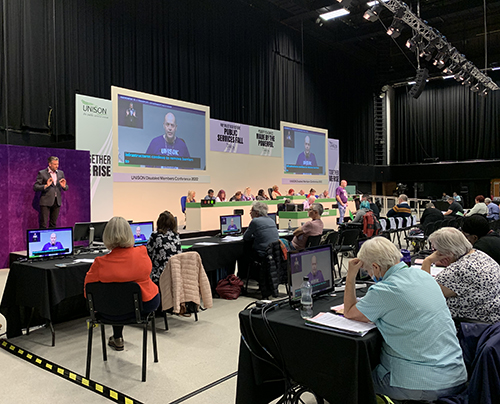Addressing delegates at UNISON’s national disabled members’ conference in Brighton this morning, the union’s president, Andrea Egan (pictured above), told them: “We face unprecedented times – and we must emerge united for the real battles that lie ahead”.
Congratulating delegates on their work in the Year of Disabled Workers, she noted that activists had trained 100 new disabled officers for the union, which she called “a fantastic achievement.”
And that was not all: “Your work on the Disability Employment Charter has been inspirational”, said Ms Egan, “and an inspiration for the union’s forthcoming Year of Black Workers.”
Unity was a thread that ran throughout her speech.
“We must be united,” she noted, as the Conservative government plans yet another period of austerity. “The Tories will do what they do best – cuts, cuts and more cuts”.
Hospitals are worried about paying for energy, schools wondering if they can keep the lights on, while the response to the cost-of-living crisis from this “government for the 1%” is “ineffective at best and deplorably negligent at worst”.
The president spoke of the EU Retained Law Bill – a “bonfire of employment rights [that] seeks to deregulate employment rights” – and outlined some of the rights that could be lost.
“UNISON is fighting this government on this bill, as we are on other grounds,” she said, and reiterated: “When we work together, we’re stronger.”
Citing UNISON victories – and not least the recent win for staff in Lancashire and Cumbria working for the NHS but employed by OCS – she observed that the whole union, from general secretary Christina McAnea to staff and activists, is working to create ways to take on employers.
“Poverty is a choice of the powerful,” she said. “As a union, we must be on the side of the worker who is unable to pay their bills.”

In the final debates of this year’s conference, Christine Jackson from the Northern region moved a motion on the importance of public transport for disabled people.
However, there is a considerable way to go. As an example, she cited the Tyne and Wear Metro, which has 60 stations, but only 10 of them have Access for All.
Access for All provides an obstacle free, accessible route from the station entrance to the platform.
Another delegate noted the discrimination against disabled people on planes, together with the general lack of support on public transport. “The only way I can travel is with my support”, she said.
Conference also supported a motion from the Black members’ caucus, which highlighted the impact of long COVID on Black members, who were finding it particularly difficult to get Personal Independence Payment (PIP) payments – even though the courts have judged long COVID to be a disability.
Rose Gale from Barking, Havering and Redbridge NHS Trust, said: “My employers are penalising people with long COVID, which is not universally recognised. Following the usual triggers [on sickness levels] is not appropriate”.
Delegates backed a motion calling for implementation of the BSL (British Sign Language) Act, with Howard Beck telling conference: “British Sign Language was recognised as a language 19 years ago. More work needs to be done. Interpreters go through roughly seven years of training. It’s a significant amount of time and commitment”.
He explained that there are many spoken language agencies popping up and claiming to be able to teach BSL – profiteering from it without knowing about it or the culture around it – and having a negative impact on provision for Deaf users.
Supporting the motion, Katrina Gilman said that her job included hiring sign language interpreters “and it’s very difficult. We need to hold our employers accountable to make sure BSL users have access to services”.
Delegates also backed motions on women’s health, breaking down barriers to employment and trans ally training.
The article ‘We must be united for battles ahead,’ says UNISON president first appeared on the UNISON National site.